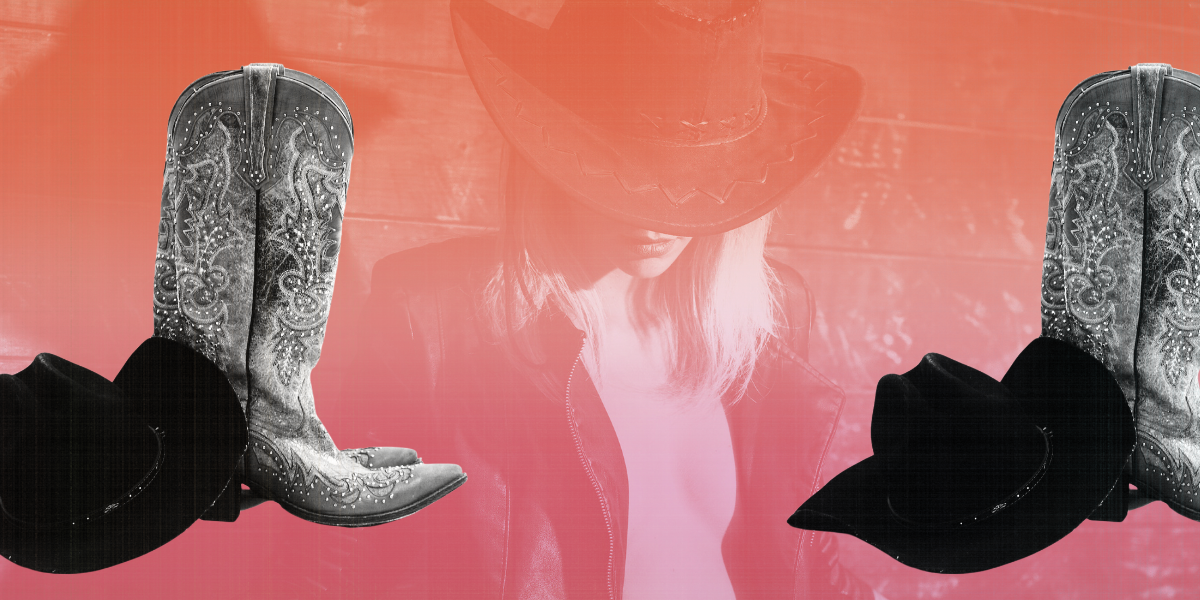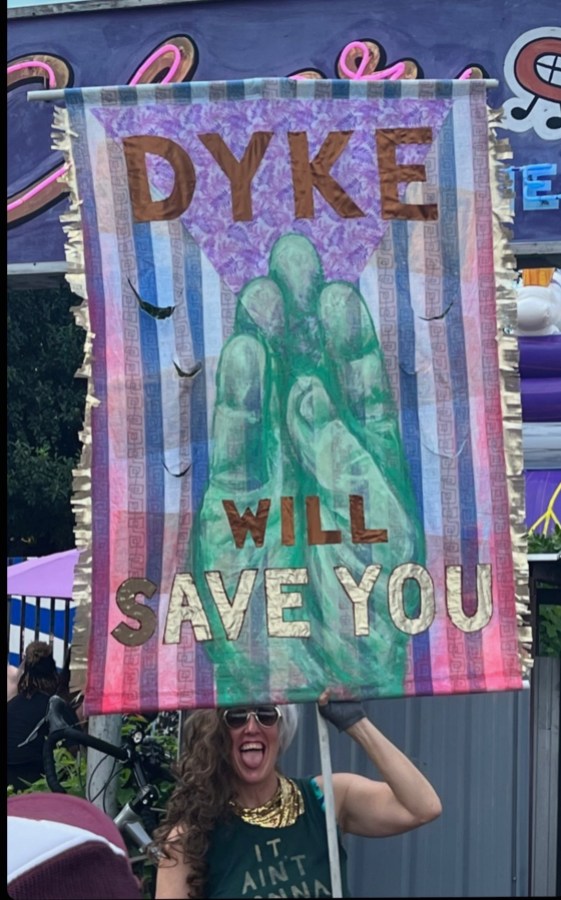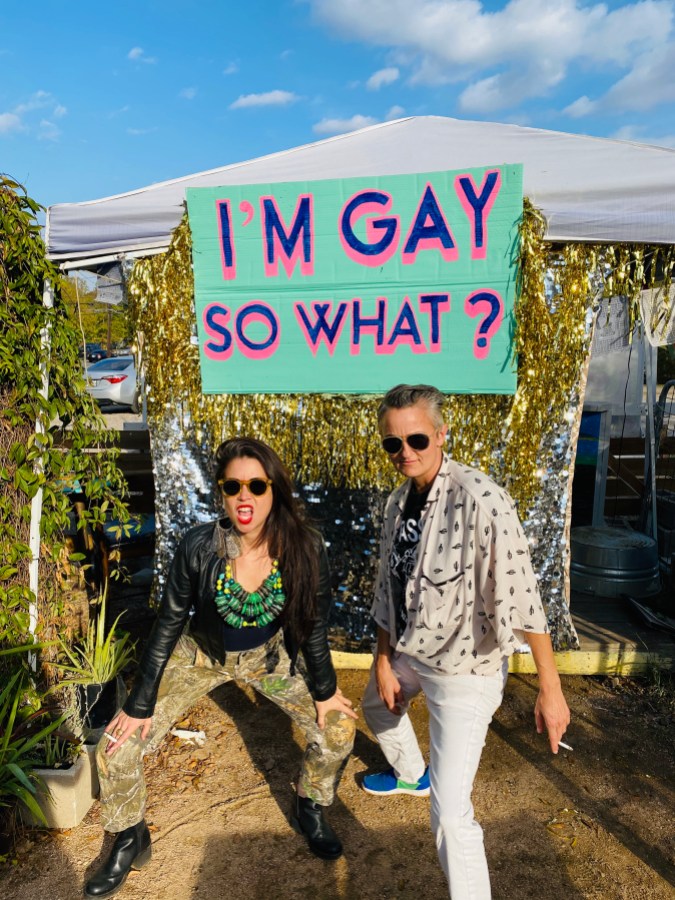
I am not normally one for leather, or skirts. To the party, I wear both, because I have no other option — it is a leather party after all, and I would rather die than dress off-theme. I wear a leather vest for a shirt, a black cowboy hat, and pearls for added flair. The party is in a discreet, always-changing location, available only by word-of-mouth invite. It costs $20 to get in, plus a sticker over your phone camera the likes of which one usually buys for yard sales. No pictures, no videos allowed. Privacy is guaranteed in a way that is at once unexpected, and appreciated.
It’s the most lesbians I’ve ever seen in one place — it’s revelatory and overwhelming. Dykes mill about like sexy grazing goats. I feel at once small and digestible, a small fish stumbled into the big, libidinal ocean. The event, nameless, and never in the same place twice — exclusive to “queer people of all genders and identities who identify with Dyke experience, and who love Dykes” (with a specification “for allies of the community to please sit this one out”), you are only able to know where to go and when if you engage with someone who can vouch for you. I get my formal invitation through a first date, who upon meeting makes it clear (unintentionally — well, most likely unintentionally) they are more well-connected in the city’s queer community than I could ever hope to be. I’m grateful for their inclusion — to be chosen — and enthralled, anticipatory. I tell everyone in my life I’ve gotten an exclusive invite to what I am calling a “lesbian sex party,” though of course I don’t know if that’s even what this is, or if it is, what that would even look like. While I am often writing and reading about, and am fascinated by, the queer intricacies of sex as a mode of connection and community understanding, I am still quite squeamish at the prospect of it in such garrulous, excessive means. I blame my Catholic upbringing, though I have been told I can only blame so much on that before it becomes stale. I just think I sound cool saying I am going to such a party — but as it turns out in attendance, while sexual connection can be a part of one’s experience here, that is not the crux of its intent. It is so much more than that.
Lesbian spaces are dwindling at a rapid rate in this country. The Lesbian Bar Project, begun in 2020 to combat the closing of such spaces, brought into awareness the sad truth that over the past 40 years the number of lesbian bars has collapsed from over 300 to less than 30. While a few have happily opened since the LBP’s induction, it is still a small number that reflects a colossal loss. While I have been lucky in my life to always find spaces and people of queerness around me, what I have lacked is that specific essence of lesbian community — in the broadest sense of the word. That is, a space that centers those outside of white male gayness, and encapsulates a wider range of genders, races, classes, and ways of moving about the world. Those who are, for lack of a better way to define it, less “profitable” or less “attractive” to the straight gaze. Queer spaces built specifically for lesbians (of all genders) portray a completely different atmosphere and energy. But here in Austin, Texas, there is a glimmer of what could be, sitting like a small gold nugget in a muddy stream, waiting to be plucked and replicated.
The organizers, Beth Schindler and Malika, have been curating parties like this for awhile. Beth, born in Kerrville but raised in Austin, and Malika, a DJ who moved to Austin in 2008, are the brains and brawn behind much of this specific event.
Beth, specifically, began her lustrous career as a DIY queer space coordinator around 12 years ago with an event called Free & Queer Cinema, at the now-shuttered North Door on Austin’s East Side. Inspired by Vito Russo’s The Celluloid Closet, the space was dedicated to showing queer films to queer audiences, allowing them space to engage with their community and interact with these films, calling out at the queer coded scenes.
After the dissolution of Free & Queer Cinema, Beth set her eyes on a new venture, a party event titled Lesbian Wedding (which celebrates its ten year anniversary this year). She says the inspiration, aptly, came from attending a lesbian wedding, and reveling in the joy and fun with friends she and collaborator Hazey Fairless didn’t get to see much of on an average day. “We were already reminiscing on how much fun we were having, in real time,” Beth says, “Thinking, ‘I wish we could do this all the time, why don’t we do this all the time.’”
The induction of Lesbian Wedding entered a void created by the end of another iconic Austin DIY queer party, GayBiGayGay, a SXSW alternative hosted in Hazey’s backyard on Springdale and MLK. “People would bring food and blankets and just lay around. Magical, easy all-day hang, which allowed for intimate connections and real friendship, the kind that’s hard to find sometimes at the club,” Beth recalls.
Lesbian Wedding sought a similar setup, showcasing bands and DJs and a potluck style food setup. While the event itself is not typically actually a lesbian wedding, there have been “no less than ten couples” who have met through the space and since gotten married. Hosted at the Sahara Lounge (formerly the blues bar TC’s), Beth emphasizes the importance of the location, as well as the gathering, is rooted in its dedication to community caregiving. “There’s always a pot of beans and rice on the bar for anyone who needs food,” she says.

photo of (and banner by) Rachael Shannon @rsmightcould / photo by Macon Reed at Dyke March
In a city like Austin, which has seen rapid change in its culture and accessibility in the past couple decades, events emphasizing community are both welcome and rare. While Dallas has Sue Ellen’s and Houston has Pearl Bar, Austin has no official brick-and-mortar lesbian bar. Most of the bars Austin does have are forced to compete with the city’s mutating financial landscape — expensive drinks, cover charges, rent hikes. Just last year, PriceListo declared Austin the third most expensive city to spend a night out in the US. And despite Austin’s progressive politics, Texas was home to 20% of all anti-LGBTQ legislation in the country in 2023. Suffice it to say, Austin is a difficult city to be in if you are not cisgender and/or heterosexual, nor if you are in a lower tax bracket.
This, Beth explains, is a crucial pillar to why she does what she does. “A lot of newer lesbian bars are full of people who look like they’re going to have a meeting about their startup, and that doesn’t represent me,” she says, “I don’t feel seen…It feels like that’s what Austin’s lesbian bar would look like. No disrespect but it’s important for me to create spaces for the community I actually engage in.” She has a point. While mainstream acceptance and tolerance of queer people has vastly improved, there is the other side of that coin, in that non-queer people are more drawn to queer spaces, sometimes in an act of voyeurism rather than with true intention of engaging with the community.
Beth says this is part of why many of her DIY events — including Lesbian Wedding, dive bar Deep Flamingo, Austin Dyke March, Lez B In Touch, and the unnamed party we are not allowed to talk about in this interview — are more “underground,” and less frequent. In order to get news on when (and even where — often for the sake of protecting the security of the space, they are never in the same location twice) the parties are happening, one must be following the right (private) social media accounts, be on the right email list, or know someone who can vouch for them. While this may strike some as gatekeeping, Beth says the intent is not to keep people out based on status, but rather based on the welfare of the community at large. Beth says they are careful with spreading information about these spaces “because of how desirable they are to the outside world, to people with money, to people who aren’t contributing to the culture.” It’s important to Beth and Malika that those entering the space are not doing so voyeuristically, or to take rather than give, but to engage with and be kind to other members of their queer community in a space in which they can feel secure that most everyone there has been vouched for as a “safe” person to be in the space with.
“It’s great for us to create a space where we can actually feel more free. And to express ourselves in a way that is often not allowed or celebrated. It allows us to see ourselves in ways to break down tropes — a lot of times in certain spaces we are uptight, and guarded, because we’re not free. So people think us dykes aren’t any fun. But it’s fucking beautiful to realize you are a rowdy bitch! I can have fun in public, but I can have more fun around my people. It’s liberating, and a big part of why I do what I do.”
In addition to her Austin ventures, Beth collaborates with California-based JenDM for parties in LA , San Francisco, and NYC as part of their production company Double Virgo (aptly named, both of them being double Virgos). She proudly shares that the two of them were responsible for a very successful “Folsom afterparty for dykes.” Since then, Double Virgo continues to engage with these larger cities’ scenes, most recently hosting Power Snatch in LA in late March, and with more parties in the works for summer Pride season.
It’s great for us to create a space where we can actually feel more free. And to express ourselves in a way that is often not allowed or celebrated.
When asked what makes the parties in Texas different from the ones in California, Beth says part of the importance is proving to queers in larger, more queer-friendly cities that “Southern queers” are just as capable and just as happy making their own spaces, even in red state pockets. “The ‘South’ is 15 minutes away from any major city. It’s 15 minutes away from NYC or LA, it’s not this other place.” Part of these parties’ charm lies in their Texan-ness; in their radical desire to take up space, in a state (and in an entire society) that would silence lesbians and other queers from being raucous, rowdy, and fun. The crux of these parties is that they can provide something beyond drinks and leather and people to make out with. For over a decade Malika and Beth have created DIY club spaces in Austin, providing that essential space for queer nightlife, with the intention for those spaces to be an act of caregiving in and of themselves. “The queer community is not a monolith.” Malika says, “There are very different levels of privilege and access among us. And we’re trying to elevate that space for Dykes and trans people and non-white people.”
“It’s interesting,” she continues, “when I go to other cities, in the US but especially in Europe — they have no idea, they’re unaware of what we have here. And I’m glad to be able to be proud of that amid the harsh politics of the South.” Malika agrees that hosting these parties is integral to their makeup — while the mentality of non-Southern queers is often “why don’t you just leave,” for those who can’t or don’t want to, these parties remain to corral the queer community in the areas that, arguably, need it most.

One sight in the parties always catches me: taped haphazardly to the drywall surrounding it are printouts of old covers of On Our Backs, the first and most significant lesbian erotica magazine. Begun in 1984 and shuttered in 2006, On Our Backs existed in part as a retaliation/response to the Feminist Sex Wars of the 70s and 80s, with tongue-in-cheek references to antiporn magazines and Playboy, but grew to a greater significance as a resource towards the reality of lesbian sexual life heretofore commandeered by straight understandings of the sexual genre. In these pages, lesbian erotica by and for lesbians could be displayed with the proper reverence, alongside interviews with prominent lesbian scholars like Leslie Feinberg and articles concerning community matters such as AIDS and trans identity. The magazine’s effort to portray “real dykes and real lesbian couples” through their own lenses was an effort to create (according to the NewBridge Project’s website) “a way for them to participate in their own representation. Making desires visible was a political statement made from the community, for the community.” It’s no small thing, for me, knowing this, to see the covers plastered against the walls, cast in faint light and between plumes of menthol smoke. It proves Beth and Malika are coming towards this event with a similar desire: to create space not just for frivolity and sexuality, but for the right of lesbians to be frivolous and sexual.
Malika refers to such parties as the “continuation of a story.” She says creating these spaces has often been about “remembering that spaces like this have existed and can happen again.” As Beth says, in regards to the difficulty of creating DIY parties on one’s own dime: “Queers are often given the scraps to work with, so this isn’t unfamiliar territory. Historically this is how we move through the world! The doors aren’t open for us often. The idea that we can’t access these doors isn’t new. We will always find a way to commune. We will always find ways to gather.”



this absolutely rules, love a DIY approach for queer spaces
Agreed! Been really lovely to be a part of this community here in ATX.
This is so excellent !!